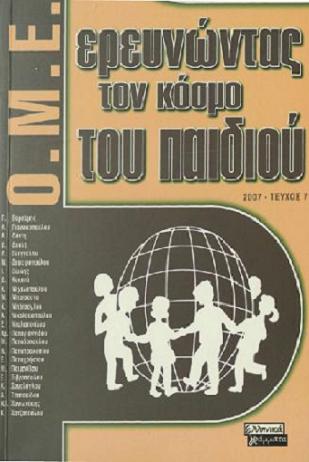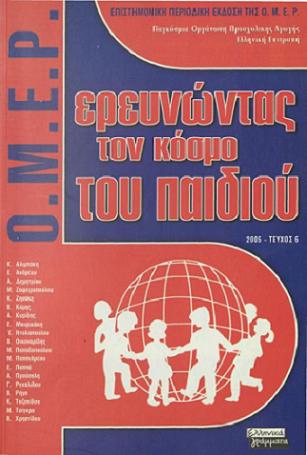Children's stories as a means of familiarization with death: Emotional reactions of primary school pupils from urban and rural areas

Abstract
The purpose of this study was to investigate and compare the emotional reactions of primary school pupils from urban and rural areas after the narration of either a modern or a folk tale about the loss of a loved one, person or animal. The sample consisted of 130 eight-yearold children and the emotions of happiness, sorrow, anger, anxiety and vivacity were examined. The study was conducted in both urban and rural schools. Analysis of results showed that narration of folk or modern tales about death of a loved one can equally affect children's emotions, irrespective of their place of living. On the contrary, tales about loss of an animal have a stronger emotional effect on children from urban areas than on children from rural areas.
Article Details
- How to Cite
-
Νικολακοπούλου (Aggeliki Nikolakopoulou) Α., & Ζαφειροπούλου (Maria Zafiropoulou) Μ. (2007). Children’s stories as a means of familiarization with death: Emotional reactions of primary school pupils from urban and rural areas. Investigating the child’s World, 7, 101–122. https://doi.org/10.12681/icw.18226
- Issue
- Vol. 7 (2007)
- Section
- Scientific articles & educational projects

This work is licensed under a Creative Commons Attribution-NonCommercial 4.0 International License.
Authors who publish with this journal agree to the following terms:
· Authors retain copyright and grant the journal right of first publication with the work simultaneously licensed under a Creative Commons Attribution Non-Commercial License that allows others to share the work with an acknowledgement of the work's authorship and initial publication in this journal.
· Authors are able to enter into separate, additional contractual arrangements for the non-exclusive distribution of the journal's published version of the work (e.g. post it to an institutional repository or publish it in a book), with an acknowledgement of its initial publication in this journal.
· Authors are permitted and encouraged to post their work online (preferably in institutional repositories or on their website) prior to and during the submission process, as it can lead to productive exchanges, as well as earlier and greater citation of published work.



